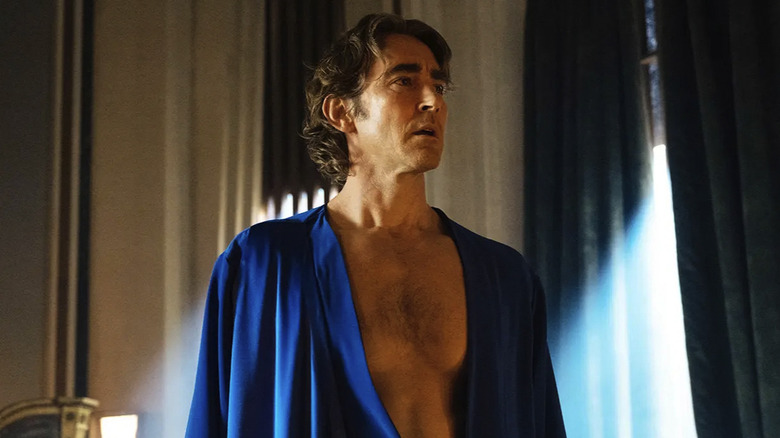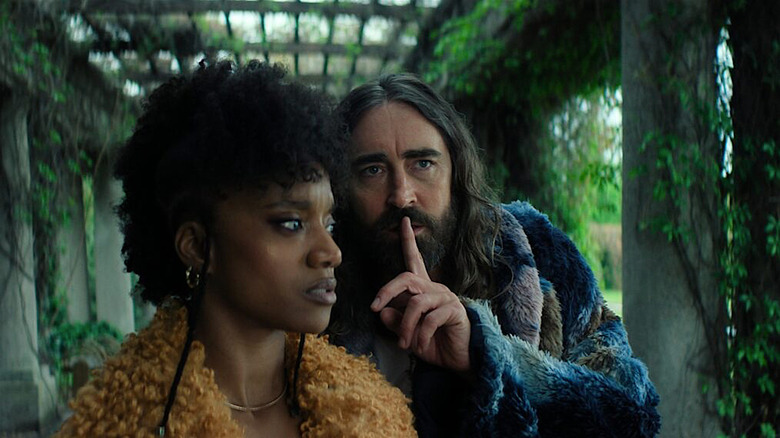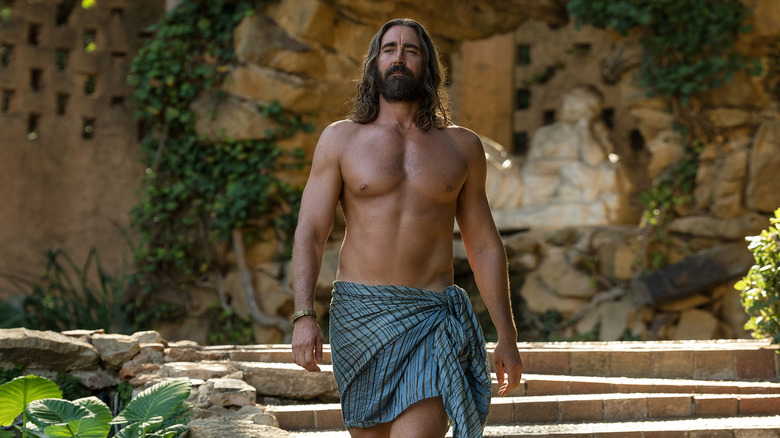Why Foundation's Brother Day Is Often Shirtless, According To Lee Pace
This article contains spoilers for "Foundation" season 3.
The most memorable member of the team of genetic emperors on Apple TV's "Foundation" is, hands down, Brother Day. Played by Lee Pace, the eccentric emperor has been different with each season as he cracks under the pressure of being the figurehead of a crumbling empire. In a recent interview, Pace reinforced the importance of his character by answering a vapid question with a deeper-than-the-surface answer. When an interviewer from Collider joked, "Is it in your contract that you need to be shirtless half the season?" Pace's answer was perfect:
"That's 'The Emperor Has No Clothes.'"
The silly response is indicative of a much larger moral and ethical undercurrent within Pace's character. When the interviewer pointed out that he was just messing around, Pace dug in, opening up about the deeper element of the character's fabled comparison point:
"Honestly, we're just messing around too. When I thought, 'I'm playing the emperor of the galaxy,' there were different ideas for what I would wear during that spiral in that first season, and I just kinda thought, 'Well, I mean, he's kind of one of the more famous emperors, the naked emperor with no clothes, so why not have a good time with this?'"
The comparison with the famous fairy tale is perfect, and not just because both characters walk around shirtless, but because they're both figureheads with the weight of the world on their shoulders — and, well, we all know the mantras about the corrupting nature of power.
The depth behind the humor of a shirtless Brother Day
It's fun to joke about Lee Pace's half-nude escapades as Emperor Cleon, but the truth is, while the question was humorous, the inspiration for the character is actually deeply entrenched in a serious and dramatic story, one where Pace is a figurehead half on a power trip and half out of his mind thanks to the pressures he faces on a daily basis.
In the show, Pace's character is facing the end of an empire that he's supposed to be leading and inspiring. From the robot-driven Star Bridge bombing of season 1 to the complete imperial collapse of season 3, the man (or more accurately, the series of clones) has been leading a failing galactic state for centuries, complete with the lives of trillions of individuals at stake. He's under a lot of pressure, to say the least.
You can add to that the fact that, in reality, Cleon lives in the shadow of Demerzel. He is a true figurehead with no agency. It's all bluster and bluff on the surface, while his positronic nanny pulls the strings from behind. And then there's the clone aspect. The idea of being decanted and then raised into the mayhem and dysfunction, not just of a royal family but of a genetically cloned one, has to take a toll on your intellect. The thought that Pace would turn to the exploits of a buck-naked, mad emperor abusing his power makes sense. It's the perfect inspiration.
The challenge of creating enduring and interesting characters in Foundation
Brother Day is just one of six or so individuals whom showrunner David S. Goyer managed to develop into recurring characters who show up from one season to the next. In a show where the timeline regularly jumps forward a century or more, having those familiar faces is important for the audience, even if it's hard to make it work in a story like this one.
This underlines one of the things that has made Apple TV's "Foundation" adaptation so impressive: It's not a shot-for-shot representation of the source material. I've gone on record multiple times now saying the show's non-canonical twists are impressive because they're managing to adapt a sprawling book series that has often been literally called unadaptable. One of the biggest changes from the source material is how Emperor Cleon differs from his depiction in Isaac Asimov's books. The genetic dynasty is made up for the show based on a single, lightly involved character from the Foundation prequels. Despite their largely non-canon, show-only existence, the trio of perpetually cloned emperors has been a stand-out element of the adaptation from the get-go. Now, as season 3 ends and season 4 is officially greenlit, Pace's character has officially gone beyond the washboard abs and listless existence and found meaning. In an exclusive interview with /Film, the actor went so far as to say that his final acts in season 3 were imbued with previously non-existent meaning:
"Suddenly, he has a purpose. He's given direction because he understands that 'My life does have value. The only reason my life has value is because this magnificent being gave me a life.'"
In the end, it's an impressive ending for a character who goes around shirtless so much of the time.


